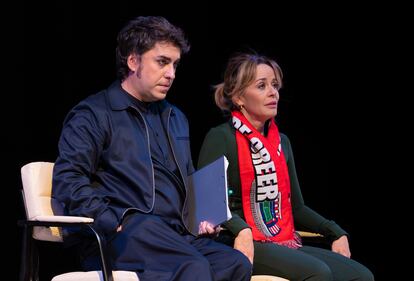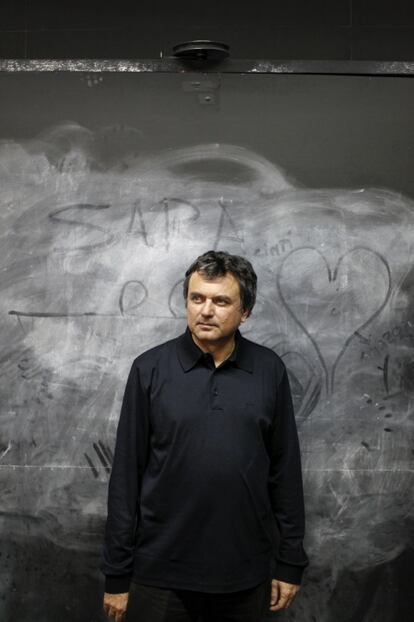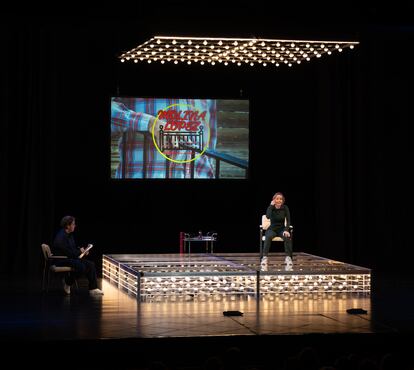Unexpectedly and without apparent cause, a shelf full of grammar treatises, from the first, Nebrija’s, to the latest edition, falls on the head of an almost illiterate woman, a cleaner at the Royal Academy of Language, and her life. changes forever. To worse. The linguistic disturbance suffered by this woman, who goes from expressing herself in a crude manner and with serious grammatical errors to being a perfect and wise scholar, who lives in a permanent state of anxiety and anger at the inaccuracies in the language of everyone she meets. approach her, she turns her life into a true ordeal. She loses her job and is forced to move away from family and friends. So much so, that she goes to see a therapist to help her be the person she used to be, the one who expressed herself in a rough and rude way, with barely any vocabulary, and thus return to her essence and identity. With The grammara high-voltage satirical comedy, the playwright Ernesto Caballero comes out in force to defend the language, without classist or elitist condemnation, but quite the opposite, also vindicating the greatness of popular speech. Starring María Adánez and José Troncoso, it premieres on Friday, the 29th, in Hall 10 of the Matadero in Madrid, where it will be performed until December 22.
Caballero (Madrid, 67 years old), long-established playwright, director of the National Dramatic Center for eight years and creator of the Teatro Urgente project, which seeks an encounter in theater with philosophy, literature or poetry, writes and directs this new montage on the uses and abuses of language, attracted by the contradiction between the “obsessive and rigid” observation of grammatical norms versus the spontaneity of speech. Also underlying the intention is to wonder and reflect on the degradation of language, a topic that I had previously explored in The author of Las Meninaswhich starred Carmen Machi. “Then I investigated the false democratization of artistic expression and here I have gone one step further and brought it to speech,” says Caballero. In The grammara parable that takes place in a space with retrofuturist overtones, has intentionally sought to pay tribute to the Spanish language and reclaim theater as a platform for the defense of that “treasure.” The performance, which takes place in the present tense and in which the audience attends the therapist’s clinical session live to return to the woman’s past, thus emphasizes the importance of language, the appropriate choice of each of the words when communicating, in the greatness of language and how to use it at a time of clear linguistic involution.

Gentleman is not sure what causes the current degradation of the language — “perhaps I wrote this feature to find or try to find the reasons,” he says — but deep down there is the power of social networks and the absolute invasion of images. . “The degradation of language or schematization has resulted in its misuse, a spurious use aimed at not calling things by their name, at creating realities as our great supreme leader of the world (read Donald Trump) now says or alternative facts. These alternative facts are also constructed by language and I do believe that there are beneficiaries of stopping calling things by their name,” explains Caballero, for whom from the stage we can once again contribute to being precise and appropriating our language. “In Spain we lack pride in our language and theater, humbly, can and should be a place to recover that precision and pride,” proclaims the director, who vindicates popular speech, what is lived versus what is normative.
The entire team of this work is truly interested in having RAE academics come to see the performance. “The only one I know and am friends with is Juan Mayorga and I asked him to help me extend the invitation because I am very interested in his visit. In this future present environment in which the work takes place, the Academy has remained in a space that continues to exist, but like the La Granja Glass Factory, that is, a site that once had a function; but today it is almost like an ornamental vestige,” says Caballero, who continues to be a militant of “only” with an accent and makes his characters in the work speak about the “notary function” of the RAE. “Language, like life, changes and when politics tries to impose a way of speaking, which is organic in the people, who are the great creator of language, a certain aberration is produced with which the RAE, in my opinion, opinion, he is being quite prudent,” adds the director, who confesses his desire to do this function at the Academy’s own headquarters. “We get by with two chairs,” he says.


